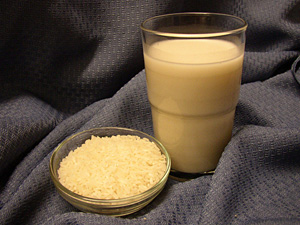
|
 |
 |
 Business News | May 2008 Business News | May 2008  
Mexico Trims Home-Grown Rice Prices
 Mica Rosenberg & Mariano Castillo Mica Rosenberg & Mariano Castillo
go to original


| Enjoy this milky, sweet rice drink from Mexico anytime you like with this Horchata Recipe.

This Mexican favorite was originally brought over by the Spaniards. Melon seeds or squash seeds were originally used, but rice became more popular and is the most common type of horchata today.

INGREDIENTS:
1 cup rice
1/2 of a cinnamon stick
1 teaspoon lime zest
5 cups drinking water
1/2 cup sugar

PREPARATION:
Grind the rice in your blender until it is ground smooth. Toss with cinnamon stick and lime zest. Let rest overnight.
After resting, place rice mixture into blender and blend until smooth. Add in 2 cups of water to mixture and soak for 2 hours. | | |
Mexico City - Mexican rice growers and millers said on Wednesday they had agreed with the government to cut prices of home-grown rice to 10 percent below international market prices and peg them at that differential.

The agreement came as part of a package of measures to ease the effect of rising food prices on consumers and also boost national production of staple grains.

"We are going to put Mexican rice on the market at the lowest possible price so that housewives make a price-quality choice," said Luis Bueno Torio, a representative of Mexican rice millers.

Agriculture Minister Alberto Cardenas, who signed the accord with rice growers and millers, said similar agreements could be reached on other products in coming weeks, including oil seeds, wheat, corn and beans.

Mexico is a net importer of rice, producing only a third of the rice it consumes.

President Felipe Calderon announced on Sunday that import tariffs on a number of foodstuffs would be reduced to zero.

Mexico, like many countries, has felt the effects of soaring prices of basic foods due to increased use of biofuels and the growing demand for grains to feed a booming Asia, compounded by droughts and market speculation.

International rice prices have nearly tripled since the beginning of the year, although they have retreated slightly this month.

Imported rice to Mexico, the bulk of which comes from the United States, will not be affected by the price cut, and domestically grown rice will be packaged and labeled as local, millers said.

He said the reduced-price rice will likely reach store shelves around August.

"We cannot, obviously, influence 100 percent of the rice but we are going to give an option with a more affordable price," he said.

TIGHT MARKET

U.S. rice producers said the Mexican agreement would not have a significant impact on their exports.

"I sympathize with the consumer and with the tough decisions these governments are making," Dwight Roberts, head of the Texas-based U.S. Rice Producers Association, told Reuters.

"It's not going to change U.S. prices; it's not going to change U.S. exports," he said.

Roberts said U.S. growers are facing a tight supply situation due to bad weather in rice growing areas this season. A smaller crop means they would be able to sell off all of their production regardless of whether there is price competition in Mexico from cheaper, nationally grown brands.

Mexico expects to produce 350,000 tonnes of rice in the 2007/08 season, a 15 percent increase from the previous cycle's harvest.

The agreement signed by the government and producers also removes some existing barriers to bringing hybrid rice seeds into Mexico, and boosts subsidies for fertilizer.

Mexico is opening a tariff-free import quota for 100,000 tonnes of beans and 250,000 tonnes of rice as part of a nation-wide package of measures to ease tight food supplies.

Under the North American Free Trade Agreement, which groups together Canada, Mexico and the United States, all U.S. grown staples enter Mexico without any import duties.

(Editing by Christian Wiessner) | 
 | |
 |



